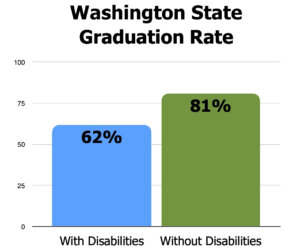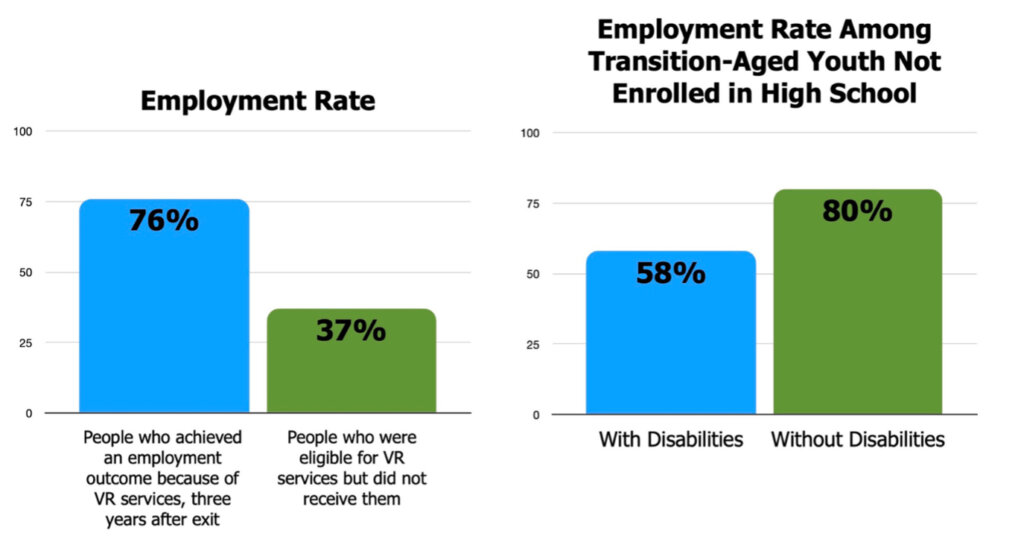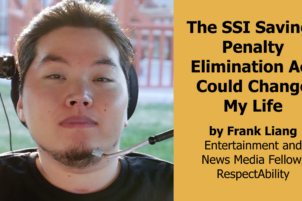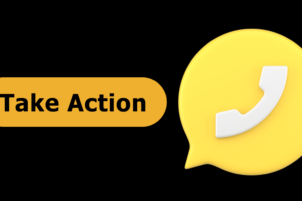Each month, RespectAbility’s Policy Department testifies on multiple plans and pieces of legislation, providing our insight, perspective, and advocacy.
This month, we are pleased to share recent testimony to the Washington State Workforce Training and Education Coordinating Board’s February 2023 meeting, and testimony to the Workforce Arizona Council regarding Public Comments on ARIZONA@WORK Job Center Vision and Structure of One Stop Delivery System.
Washington Workforce Training and Education Coordinating Board
To: Members and Staff, Washington Workforce Training and Education Coordinating Board
From: Staff, Board, and Apprentices of RespectAbility
Re: Public Comments for February 23, 2023 Meeting
Dear Co-Chair Chandler, Co-Chair Brown, and Board Members:
Thank you for the opportunity to offer our comments for the Washington State Workforce Training and Education Coordinating Board’s February 2023 meeting. RespectAbility is a nonpartisan, nonprofit disability inclusion organization dedicated to fighting stigmas and advancing opportunities for the more than 60 million Americans with disabilities. This is America’s largest minority group and one that anyone could join due to aging, illness, or accident. In 2020 in Washington State, there was an estimated 1,273,876 people with disabilities.
RespectAbility makes the following policy recommendations based on our expertise in recruiting and employing people with disabilities, for Washington to improve outcomes for workers with disabilities:
- Focus on closing the gap in labor force participation rates between Washingtonians with and without disabilities: In 2020, Washington’s employment rate for all working-age people with disabilities in America was 5 percent, compared to 75.7 percent of people without disabilities. An increase in labor force participation amongst people with disabilities would be a significant benefit for employers struggling with labor shortages.
- Ensure that all Washington workforce programs are inclusive to people with disabilities: There are more than 60 million people nationwide with some a disability, including both hidden and apparent disabilities. Washington employers will benefit tremendously from building a recruitment and workforce culture that empowers this key demographic. Establishing this culture and leading with best practices ensure people with disabilities remain in the workforce.
 Close the gap in high school and college graduation rates: In Washington’s K-12 public schools, there are more than 143,000 students with disabilities. The gap in graduation rates between students with and without disabilities continues to undermine their futures. Critically, among the class of 2019, the high school graduation rate for students with disabilities was only 62 percent, compared to 81 percent of students without disabilities. This means that thousands of students with disabilities are leaving Washington’s school system with uncertain prospects in the workforce.
Close the gap in high school and college graduation rates: In Washington’s K-12 public schools, there are more than 143,000 students with disabilities. The gap in graduation rates between students with and without disabilities continues to undermine their futures. Critically, among the class of 2019, the high school graduation rate for students with disabilities was only 62 percent, compared to 81 percent of students without disabilities. This means that thousands of students with disabilities are leaving Washington’s school system with uncertain prospects in the workforce.- Employment Transition Services: The National Longitudinal Transition Study-2 (NLTS2) found that among youth with disabilities who had been out of high school 1 to 4 years, 58 percent worked full time at their current or most recent job (Newman et al., 2009). In contrast, almost 80 percent of transition-aged youth without a disability and not enrolled in high school were employed (U.S. Bureau of Labor Statistics, 2017). RespectAbility supports robust investment in Vocational Rehabilitation (VR) programs since data demonstrates that it is cost-effective and successful. The U.S. Department of Education found that among persons who achieved an employment outcome because of VR services, 76 percent were still working three years after exit compared to 37 percent of people who were eligible for VR services but did not receive them (Hayward & Schmidt-Davis, 2003).

- Nothing About Us Without Us: We have found that underrepresented populations are often left out of the policy decisions that affect them most. The Washington State Legislature has introduced two bills on this topic in 2023, Senate Bill 5616 and House Bill 1541. As a disability led nonprofit, RespectAbility ardently encourages the board to proactively recruit underrepresented populations with lived experiences into its membership and to collaborate with other public and private entities to do the same.
Workforce Arizona Council
To: Workforce Arizona Council
Re: Public Comments on ARIZONA@WORK Job Center Vision and Structure of One Stop Delivery System
Date: February 15, 2023
Dear Workforce Arizona Council,
Thank you very much for your leadership, your commitment, and your efforts advancing opportunities for all Arizonans, especially Arizonans with Disabilities. When it was passed with broad, bipartisan support in 2014, the Workforce Innovation and Opportunity Act (WIOA) invested unprecedented resources into efforts to get people with barriers to employment into the labor force.
We commend the Council for the plan’s clear cognizance of the nearly one million individuals with disabilities that make up 13.5% of Arizona’s population and encourage the Council to continue the process of bringing the current 44.1% employment rate for working age Arizonans with Disabilities up to that of the public. By current estimates, there are at least 250,000 working age Arizonans with Disabilities who could be added to a very tight labor pool by the appropriate policies.
Build Explicit Disability Strategies into the Plan
With employment of Arizonans with Disabilities hovering so far below that of the general population, we would like to encourage a more explicit incorporation of disability specific strategies into the plan.
This begins with the definition of the one stop delivery system which specifically cites “workforce development, educational and other human services.” We recommend that the involvement of vocational rehabilitation and disability-related services be included directly in the elements of the system along with the three that are mentioned. This should include but not be limited to HCBS waivers, developmental services provision, and vocational rehabilitation.
While we do not suggest that specialized centers should be created for people with disabilities, as that would create a form of segregation, we think it is important that these specialized centers serve people with disabilities who fit the service population. Too often, specialized service providers turn away job seekers with disabilities who lose access to the specialized services. While the plan mentions that requirement of all one stop service providers to be accessible to people with disabilities, there is value to reemphasizing it here. Similarly, there is value to calling out access and vocational rehabilitation in section IV B where the plan lists the services required of a one stop center.
The direct linkage through technology to program staff of each program must include that this electronic link be accessible to Arizonans with disabilities. This should be explicitly stated in the section on electronic service delivery. While it is true that it is covered by the requirement that the system be “in compliance with the nondiscrimination and equal opportunity provisions of WIOA,” a more explicit call out would better ensure compliance.
Ticket To Work Is Essential to The Long-Term Employment of People with Disabilities
We are concerned that the “Employment and training programs administered by the Social Security Administration, including the Ticket to Work and Self-Sufficiency Program established under sec. 1148 of the Social Security Act (42 U.S.C. 1320b–19),” are listed as optional one-stop partners. Ticket to work is a critical tool in bringing people with disabilities from the benefit system to the workforce. RespectAbility has learned that the Social Security Administration is concerned about a drastic underutilization of these programs. By making these programs a mandatory presence at one stop locations, the Council can increase utilization in Arizona.
Ensure That People with Disabilities Are Part of Cohort and Sector Strategies
The plan envisions that an employment driven workforce development system must focus on the needs of both job seekers and employers. The pandemic has made remote work an accepted reality for thousands of workers, normalizing an accommodation request long championed by workers with disabilities. This has opened an unprecedented window for people with disabilities to contribute to the success of nonprofits, communities and beyond.
This concept can be applied to work-based learning opportunities. RespectAbility has retooled our National Leadership Program from being a cohort-based internship program located in Washington D.C., into an all-virtual, work-from-anywhere skills-based training program. Such approaches have major implications for efforts to train workers for good-paying jobs in the knowledge economy and the nonprofit sector.
We have identified that cohort-based models offer a cost-effective method for delivering workforce services, especially for transition aged youth with disabilities. Cohorts offer the chance to blend and braid funding to support training and build in a social component among cohort participants crucial to soft-skill development. We recommend that professionals involved with Pre-Employment Transition Services (Pre-ETS) examine proven models of cohort-based services and look to build on models such as:
Project RISE in Virginia: Project RISE (Resilience, Independence, Self-Advocacy, Employment), sponsored with the support of the Virginia Chapter of National Federation for the Blind, is a cohort based, skill development focused training program for blind and low vision students ages 14-21. Over the course of a 10-month program, students are trained in independent living skills and in professional skills for use in future employment. Students build social connection, even in virtual spaces by connecting and collaborating with fellow program participants. Working with each student, educational and career goals are developed and supported through internship or volunteer placement.
Project SEARCH and the Caring Economy: Project SEARCH is a school-to-work transition program for adults with intellectual and developmental disabilities that prepares them for good paying careers in hospitals, elder-care, and the caring economy. By placing students with disabilities into three internships at a job site over the course of an academic year, student learn skills, build confidence, and gain competitive work experience. There is an opportunity to expand Project SEARCH and help more job seekers with disabilities launch careers in the caring economy.
There are numerous other fields in addition to healthcare that may be a good fit for people with disabilities. Two prominent examples are the financial services sector, and the tech sector. While we recognize that people with disabilities can work in any field, we encourage the sector-based employment strategies advanced by the Council to take a special look at sectors with high opportunities for Arizonans with Disabilities.







